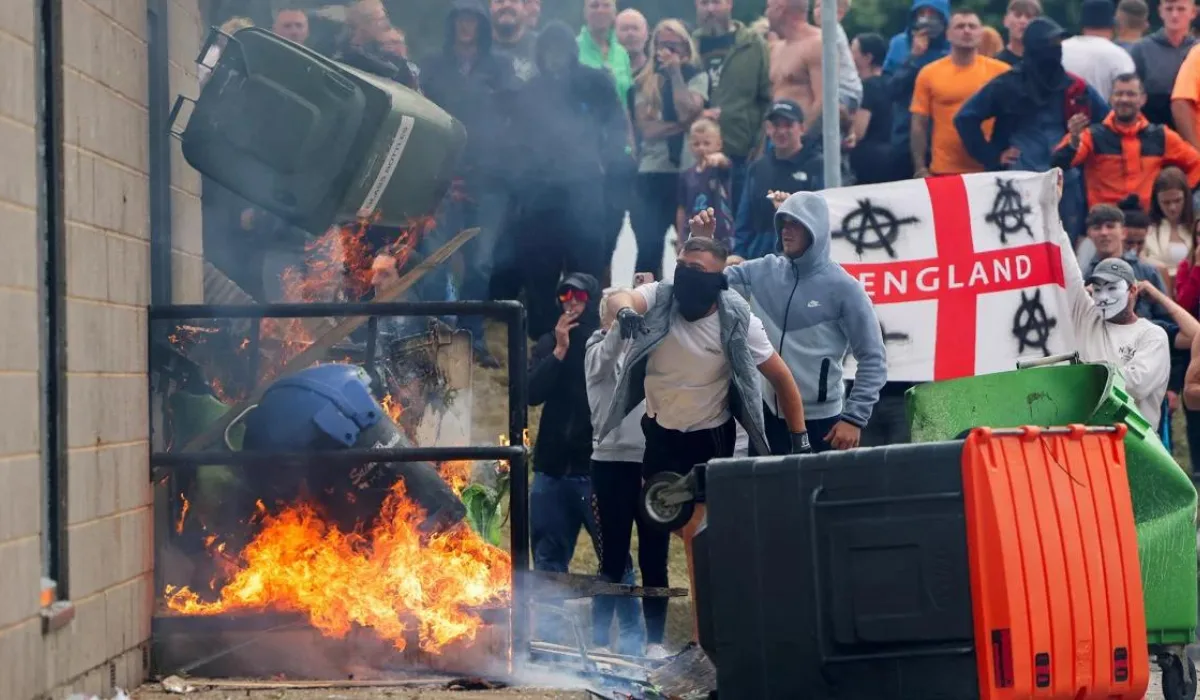Police anticipate an escalation in violence, with up to thirty additional riots expected across England. This unrest follows the tragic killing of three young girls in Southport just a week earlier, which has now sparked scenes of chaos and destruction in over twenty towns and cities. Social media activity suggests that far-right groups are mobilising towards coordinated attacks against immigration centres, heightening tensions within affected communities.
Government’s stance on rioting
In light of these disturbances, Prime Minister Sir Keir Starmer has stated that those involved in the riots will face stringent legal action. During a recent emergency meeting of the Cobra committee, he revealed that over one hundred individuals have already been charged, asserting that the criminal justice system’s response has been swift and decisive. Notably, a man named Jordan Parlour, 28, of Leeds, has been charged with inciting racial hatred through social media posts, becoming the first arrest linked to this unrest.
Community reactions to violence
The duality of community responses has been profoundly highlighted by Zara Mohammed, Secretary-General of the Muslim Council of Britain, who shared her mixed feelings about the ongoing riots. While acknowledging the fear permeating her community, she also expressed hope at the sight of residents coming together to clean up their neighbourhoods in the aftermath of the violence.
“It’s heartening to see so many who yearn for a diverse and inclusive Britain,”
she noted, condemning right-wing provocateurs for perpetuating misinformation that exacerbates tensions.
Calls for unity from religious leaders
In a united front, the leadership of Churches Together in England, representing a multitude of denominations, has urged communities to collaborate in combating racism and societal division. They recognised the palpable anger surrounding the tragic events in Southport while emphasising the need for solidarity to address concerns regarding immigration. Their message also lauded local churches for their role in providing support and facilitating community resilience during these trying times.
Insights on community cohesion
In response to recent divisive comments from Elon Musk regarding perceived disparities in police treatment of different protest groups, the Community Security Trust has cautioned against spreading unsubstantiated claims that could further deepen societal rifts.
Archbishop Justin Welby expressed dismay over the rioting, asserting that such actions were contrary to the British spirit of peaceful protest. He emphasized the necessity for a unified moral vision that embraces and celebrates the nation’s diversity while discouraging violence.
A broader call against hate
In the wake of vandalism against Muslim graves in a Lancashire cemetery during the riots, Anglican priest Father Alex Frost implored individuals of all faiths—and those without faith—to unite against hate. He insisted on the collective responsibility to promote goodness and reject division within society. Local volunteers mobilised swiftly to restore the damaged graves, reflecting a community-driven commitment to healing.
Changing perspectives on funerals
As society grapples with these issues, a recent study by Co-op Funeralcare indicates a shift in funeral practices across the UK. More families are opting for themed “celebrations of life” outside traditional religious settings, often incorporating personal touches such as attire choices and even pets in the ceremonies. Nearly seventy-five per cent of undertakers reported this trend, signalling a growing preference for more personalised and less conventional farewells.
Navigating complexity together
As the UK faces these tough times marked by conflict and community strife, it is crucial for all to engage in dialogue, foster understanding, and work collaboratively towards an inclusive society. The path forward lies in harnessing the strength of community and faith leaders to combat hatred and build those essential bridges of solidarity.


